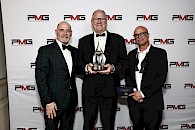
Black History / Black Futures Month - Josie Delgiglio
“I feel that we go through seasons in life – and to me, at this point in time, we are in the winter.”
Josie Delgiglio isn’t simply looking out the window and stating the obvious. Though you can feel the crisp winter wind in the air, February also represents an important period of both reflection and forward-thinking, in the form of Black History & Black Futures Month.
“In the winter, we are planting the seeds. Hopefully, in years to come, [it will be time] for us to reap the harvest when we go through our month of Black history,” she continues.
The original path for today’s momentum was inspired, says Josie, by historical figures in Black history with passion; fire; those who took action. While Martin Luther King, Jr. is a popular example of one such person, there are others she’s keen to highlight.
“Stokely Carmichael, rebellious or not, is another part of the passion – a person of colour who's tired of just sitting there and being abused,” Josie adds, noting Angela Davis and Malcolm X as other influential figures.
“They've laid their body down for us. They've made staircases for us to climb above to reach a pinnacle. And I'm not saying it's just Black people. The freedom of one is the freedom of all.”
That idea of unity across all groups is a meaningful one for Josie, an IATSE 891 member of over 20 years. When asked what she would expect from a union colleague who wants to be an ally to Black communities, she shared a story of an on-set incident she faced.
While on a project, Josie received a racist comment from a colleague – a comment that hit her to the core. Upon reporting the comment to her designer, it was merely laughed off as a misunderstanding. Yet, other colleagues around her at the time rallied around her, embraced, supported and above all, defended her.
“Some of them wanted to go to fisticuffs. I said, ‘No, we are greater than that. We are greater than that. We don't need to do that.’ They were willing to put themselves on the front line for me.”
This underscores what it means to be an ally – the willingness to stand up and say something to support a community.
“We can get together as a group and unite…you're not coming in, you're [not] harming any of us,” she said. “That's how we can keep it tight. So we're not seeing colour. We're seeing humanity here.”
This touches on a larger point that Josie makes: when someone isn’t feeling safe on a film set, it impacts everyone’s health.
“If someone around me is being demeaned…I'm also standing there as a human being. I'm hearing it. I'm being shamed also. So it's not just for the person that's been hurt – it's also for me, it's for my mental health. And I'm hearing this. I'm taking it home with me.”
When asked what unions can do to elevate contributions from Black communities and to improve health and safety in the workplace, Josie provided an unequivocal and definitive answer: inclusion.
“If we feel respected by our crew members…we put the fears away and then we put our greatness forward. If we feel that we have to fight the battle of our pigment and the racism that follows…not feeling supported makes you mentally ill because you can't bring it out, you have to suppress it and you have to walk forward. You cannot be who you are,” she explained.
Josie felt she had to suppress parts of her identity upon entering the film industry, including her sewing ability.
“When I managed to get in, I felt that some union members in the Costume Department place you where they felt they wanted you to be. You couldn't rise above it.”
As a result, Josie found herself in the role of set supervisor, a role which she honed and mastered for years. Then, she got a phone call from a designer telling her about an opening.
“The designer called me because I was on the [availability] list and she was hiring a non-union person,” Josie began.
“So she called me and she said, ‘Oh, I'm just calling you because the Union's making me do it.’”
It is a Union requirement that all productions pursue available members and permittees first when hiring, before turning to non-union workers.
Turning a mental corner, she realized that a new strategy was in order.
“At that point, I said, I'm not going to beg my equal for a job. I'm going to go to the top of the rung and let them turn me down if they choose to. It made me push to be a designer. I have a degree in fashion, design and clothing technology, so I know how to sew.”
Josie doesn’t just have the education, skills and training either – she runs her own clothing business in addition to her work in the motion picture industry.
“I run my own business, Adaptive Comfort Clothing. I design clothing for people with special needs,” she outlines – noting that she also just won a $10,000 competition to go into a business program with influential American entrepreneur Tony Robbins.
Yet, despite this resounding success in her work outside of film, it stands in contrast to what she has been tapped to do in the industry – and the disconnect is palpable.
“It shows that I'm fully capable. I've been the CEO of my family. I've run my family for decades. So you know what? I can satisfy you. If you decide you're giving Josie the opportunity, I can do it.”
While reflecting on past experiences, Josie lamented on the role her skin colour played in the barriers to job entry and career advancement she encountered.
“Struggling to look for a job and being who I am, I always felt that because of my colour, I wouldn't get the job, and often times I didn't…When I got married and my name changed to Delgiglio, I was kind of happy because it sounds Italian – not that Josephine Francis sounded Black. But for it to sound Italian, I could hide behind that,” she said.
This is a common problem faced by people from racialized and underrepresented communities, who end up having to change their name on a resume to simply get in the door and be given interview consideration.
Josie indicates that a spirit of unity, inclusion and a supportive membership are the principal ways forward – so that everyone on set, regardless of colour, can reap the rewards of the seeds sown yesterday, today, and tomorrow.
Black History and Black Futures Month is after all, as Josie summarizes, a chance for everyone to reflect and look for ways to build a better future.
“We are sharing [Black History & Futures Month] with each other. And that's what I hope for the future of Black history: for us to dance through life with the joy of our success and for all of us, all the nation, to come together.”








